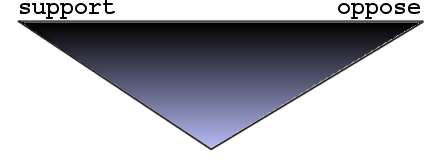|
supporting arguments
20% ·
[make argument]
33%
· greater danger
by wikipedia on 2005-04-02 05:15:41
One who can be moved to violence by hatred of a class of people presents greater danger to society than one who merely hates an individual. If normal punishments are inadequate deterrents, then additional punishments may deter crimes motivated by hate.
It is not unusual to make thoughts or states of mind elements of a crime. For example, the distinction between first-degree murder, second-degree murder, and manslaughter depends on the degree to which the killing was deliberate or premeditated. The definition of fraud requires that the perpetrator knowingly defraud the victim.
25%
· reverse effect
by wikipedia on 2005-04-02 05:27:50
Politically correct or socially sanctioned hate is a problem, and that legislation will need to explicitly cover those often deemed less worthy of protection, such as WASP men.
By enacting them, individuals would face greater discouragement from committing hate crimes.
All laws are subjective, and that if society can determine that one crime deserves more punishment than another (i.e. murder (wikipedia.org) vs. involuntary manslaughter (wikipedia.org)) then it can also determine what motivations deserve harsher punishments (wikipedia.org).
|
opposing arguments
79% ·
[make argument]
100%
· 1st amendment
by wikipedia on 2005-04-02 04:55:56
Imposing a greater penalty on an act committed in hate would thus make hating illegal. This is a direct infringement on First Amendment (wikipedia.org) rights.
100%
· thought crime?
by wikipedia on 2005-04-02 05:06:15
Distinguishing a hate crime requires reading the mind of the accused, a dubious prospect at best and perhaps not something that should be considered when deciding on punishments. In short, hate crime legislation criminalizes thought (wikipedia.org) and denies equal protection (wikipedia.org). In addition, hate crime prosecutions seek to punish an individual for motive (wikipedia.org) rather than intent (wikipedia.org). For example, the difference between first or second degree murder is intent, not motive.
100%
· reverse effect
by metric on 2005-04-03 03:45:53
Politically correct or socially sanctioned hate is a problem, and that legislation will need to explicitly cover those often deemed less worthy of protection, such as WASP men.
|
Powered by Debatepoint.
All text is available under the terms of the GNU Free Documentation License.
